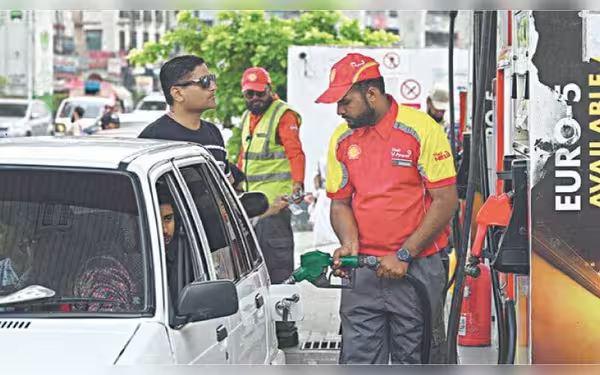Saturday, November 16, 2024 07:39 PM
Government Increases Petrol and Diesel Prices Despite Global Decline
- Petrol price rises by Rs1.35 per litre.
- Diesel price increases by Rs3.85 per litre.
- Consumers face higher fuel costs amid global price drop.
 Image Credits: dawn
Image Credits: dawnThe government of Pakistan raises petrol and diesel prices despite a decline in global oil rates, leaving consumers in disbelief.
In a surprising turn of events, the government of Pakistan has announced an increase in the prices of petrol and high-speed diesel (HSD) for the upcoming fortnight, despite a decline in international market rates. This decision has left many consumers and experts bewildered, as they were anticipating a reduction in fuel prices following the recent drop in global oil costs.
According to the official announcement made on Thursday, the price of petrol will rise by Rs1.35 per litre, bringing the new price to Rs248.38. Similarly, the price of diesel will increase by Rs3.85, making it Rs255.14 per litre. In contrast, the government has reduced the prices of light diesel and kerosene by Rs2.61 and Rs1.48 per litre, respectively. This mixed bag of price changes has raised eyebrows among consumers who were hoping for a more significant decrease in fuel costs.
The Ministry of Finance stated that the Oil and Gas Regulatory Authority (Ogra) calculated these new prices based on fluctuations in the international market. However, sources indicate that the government retained part of the price increase that was due on October 15, with the expectation that prices would be lower in the following quarter. Unfortunately, this strategy led to inventory losses for oil companies, prompting them to voice their concerns to the government.
Interestingly, while international prices for petrol and HSD have decreased by approximately $1.5 and $2.5 per barrel, respectively, the government has opted to raise local prices. The average price of petrol fell to about $76 per barrel from $77.5, and HSD dropped to around $84 per barrel from $86.5. This discrepancy between international and local prices has left many questioning the rationale behind the government's decision.
Currently, the government imposes a tax of about Rs76 per litre on both petrol and HSD, while the general sales tax on all petroleum products remains at zero. Additionally, a petroleum development levy of Rs60 per litre is charged, which significantly impacts consumers. Furthermore, customs duties and distribution margins add to the overall cost, making fuel prices a burden for the average citizen.
In a related development, Ogra has also announced an increase in the price of liquid petroleum gas (LPG) by approximately Rs2.88 per kg for November. The new price for an 11.8kg cylinder will be Rs2,999.47, up from Rs2,965.38 in September. This increase is attributed to the linkage of LPG prices with the Saudi Aramco-CP and the US dollar exchange rate.
As consumers grapple with these rising costs, it is essential to consider the broader implications of such price hikes. Fuel prices directly affect transportation costs, which in turn influence the prices of goods and services across the board. With the government’s decision to increase fuel prices, many households may find their budgets stretched even further. It is crucial for the government to communicate transparently with the public about the reasons behind these price adjustments and to explore ways to alleviate the financial burden on consumers.













